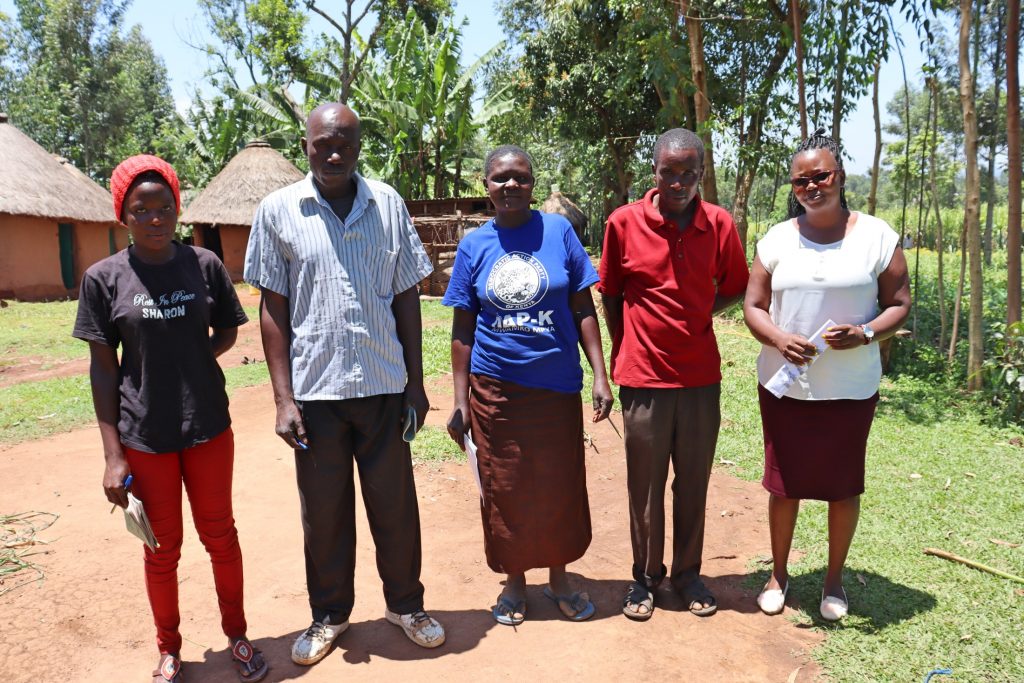A Tale of Two Brothers – Water for Peace
March 22nd is World Water Day, a day to observe the importance of water and the ongoing work to resolve the world’s water crisis. This year’s theme is Water for Peace, which resonates with us at The Water Project. After all, we see how water fosters peace in our work every day — and how a lack of water brings conflict.
One story that came to our minds as soon as we saw this year’s World Water Day theme was the tale of two brothers living in Sambuli Community in Western Kenya.
To relay this tale, we invited Jacklyne Chelagat, who worked with the community throughout their protected spring’s construction and implementation, to tell us the story of brothers Patrick and Baraza.

“Land is the most valued possession among Africans, and it is a birthright for each child (especially boys) to inherit a parcel of land from the parents,” Jacklyne explained. “Out of this practice springs a lot of enmity and grudges between members of the same family.
“A dispute over land came up between Patrick and his brother Baraza after their father died and he had not shared his land among his sons. [A] bitter rivalry erupted between them after each one felt the land was not fairly divided among them by their foster parents and community leadership. The enmity between them was so bad that whenever a chicken or an animal would cross from one man’s homestead to the other, he would even kill it.
“Since the spring was exactly in between their farms, each one of them felt that he was the one to make the decision whether the spring would be protected or not, and each one was determined to make a decision against the other. This made the whole process so difficult and complicated.
“Since many households were fetching water from that spring, they sought to engage the intervention of the local leadership, led by the area Member of the County Assembly to address the issue. A decision was reached that the spring was to be protected. Luckily, both Patrick and Baraza were in that meeting. During planning, I engaged each one of them [about] the roles they were to play in the implementation process. On a number of occasions, I would bring them together to discuss the progress we were making.
“Gradually, the heaviness in their hearts started melting down. As the project implementation progressed, so did the peace [creep] in. [The brothers] started talking to one another, and they would even come together and team up with the rest [of the community] during the implementation process.
“By the time the construction was being completed, they were so much together that they would even visit one another in their homes. As a matter of fact, during [the] training, which was conducted in Patrick Wanami’s homestead, Baraza was present and was actively involved.
“[The] members of Sambuli community were left wondering how water had played an important part in bringing [these] two brothers together; where all efforts had not succeeded. Water and clean water for that matter, is able to clean any form of stain, including enmity and hatred.”
Living in the world we do, it’s easy to think of conflict solely based on the headlines we see in the news: international war and bickering political parties. In other words, these are conflicts we, as regular people and not diplomats or world leaders, can’t actually solve. But when it comes to a conflict over vital resources, like conflicts over water, you can do something. Increasing access to water not only makes the world a more equitable place, but it resolves fights that have plagued water-stressed areas for generations.
The story of Patrick and Baraza serves as a powerful testament to the transformative power of water. Beyond its essential role in sustaining life, water has the remarkable capacity to bridge divides, heal longstanding conflicts, and foster unity and peace within communities.
The Water Project’s mission is to provide access to clean, safe, and reliable water sources in communities deeply divided by conflicts, poverty, and inequality. Stories like these remind us of the ripple effects that water projects can create, extending far beyond the immediate benefits of clean water.
Today, as we celebrate the essence of water in bringing peace and prosperity, we invite you to join us in this noble cause. Your donation can light up lives, mend broken bonds, and nurture the seeds of peace in communities around the world. Every contribution brings us closer to a world where everyone has access to the water they need to thrive. On this World Water Day, let’s commit to being part of the solution — for peace, for prosperity, and for the planet.
Donate to The Water Project and become a catalyst for change in someone’s life today.
Home More Like ThisTweet